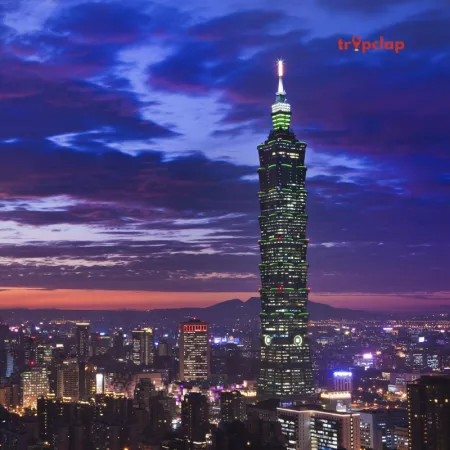
Taiwan
Duration
7 to 14 Days
7 to 14 Days
Best time to visit
Apr-May, Oct-Nov
Apr-May, Oct-Nov
Theme
Hill Station, Adventure, Heritage, Beaches
Hill Station, Adventure, Heritage, Beaches
Taiwan Travel Guide
Taiwan is an island nation located in East Asia, known for its stunning natural landscapes, rich history, and vibrant culture. With a history shaped by various influences, including indigenous tribes, Chinese settlers, and Japanese occupation, Taiwan offers a unique blend of traditions and modernity. The country is famous for its delicious street food, bustling night markets, and beautiful temples.Top Attractions in Taiwan
1. Taroko Gorge 2. Sun Moon Lake 3. Jiufen Old Street 4. Alishan National Scenic Area 5. Kenting National ParkTaiwan is Famous for
Taiwan is famous for its diverse culinary scene, including xiao long bao (soup dumplings), bubble tea, and stinky tofu.Top Attractions in Taiwan
- Taroko Gorge - Sun Moon Lake - Jiufen Old Street - Alishan National Scenic Area - Kenting National ParkWhat's Great about Travelling to Taiwan?
- Rich cultural experiences - Stunning natural landscapes - Delicious and affordable street food - Warm and welcoming localsWhat's Not So Great about Travelling to Taiwan?
- Language barrier for non-Mandarin speakers - Crowded tourist areas - Typhoon season from June to OctoberTravel Tips for Taiwan
- Carry cash as many places do not accept credit cards - Purchase an EasyCard for convenient public transportation - Respect local customs and traditions - Be cautious of pickpockets in crowded areasImportant Taiwan trip information
- Ideal Duration: A week to 10 days is ideal to explore the main attractions.
- Best Time to Visit: Visit in spring (April to June) or autumn (September to November) for pleasant weather.
- Nearby Airports and Railway Stations: Taiwan Taoyuan International Airport is the main airport, and Taipei Main Station is a major railway hub.
Top 1 Places to visit in Taiwan
FAQ's on Taiwan
Q1: What is the best time to visit Taiwan?
The best time to visit Taiwan is during the autumn months from September to November when the weather is mild, and the island is alive with vibrant colors. Spring (March to May) is also a good time with cherry blossoms in full bloom. Avoid the summer months due to high humidity and typhoon season, while winter can be chilly in certain areas. Consider visiting during major festivals like Lantern Festival in February or Double Ten Day in October for a cultural experience.
Q2: Do I need a visa to travel to Taiwan?
Travelers from many countries, including the US, Canada, UK, and EU nations, can enter Taiwan visa-free for stays up to 90 days. However, some countries may require a visa, so it is best to check with the Taiwanese embassy or consulate in your country before traveling. If you plan to stay longer or for specific purposes like work or study, you will need to apply for the appropriate visa in advance.
Q3: What are the must-visit attractions in Taiwan?
Taiwan is known for its diverse attractions, including the bustling night markets of Taipei, the stunning Taroko Gorge in Hualien, the iconic Taipei 101 skyscraper, and the picturesque Sun Moon Lake in Nantou. Explore the historic streets of Jiufen, relax in the hot springs of Beitou, visit the National Palace Museum for a glimpse of Chinese art and history, and don't miss out on experiencing the traditional culture of indigenous tribes in places like Wulai and Pingtung.
Q4: Is Taiwan a safe place to travel?
Taiwan is considered a safe travel destination with low crime rates. However, like any other place, it is advisable to take standard precautions to ensure your safety. Avoid isolated areas at night, be cautious of your belongings in crowded places, and pay attention to weather warnings during typhoon season. Overall, Taiwan is known for its friendly and helpful locals, making it a welcoming place for tourists.
Q5: What is the local currency in Taiwan and can I use credit cards?
The local currency in Taiwan is the New Taiwan Dollar (TWD). Credit cards are widely accepted in hotels, restaurants, and larger stores, especially in urban areas. It is advisable to carry cash for smaller establishments or markets. ATMs are easily accessible, and major credit cards like Visa and MasterCard are commonly used. Notify your bank before traveling to avoid any issues with card transactions.
Q6: What is the local cuisine like in Taiwan?
Taiwanese cuisine is diverse and flavorful, influenced by Chinese, Japanese, and indigenous ingredients and cooking styles. Don't miss trying iconic dishes like beef noodle soup, xiao long bao (soup dumplings), oyster omelets, stinky tofu, and bubble tea. Night markets are a foodie paradise with a variety of street food offerings. Vegetarians and vegans will also find delicious options like vegetarian hot pot and tofu dishes. Be open to trying new flavors and textures for a true taste of Taiwan.
Q7: What transportation options are available in Taiwan?
Taiwan has an efficient transportation system that includes an extensive network of trains, high-speed rail, buses, and the Taipei Metro. Taxis are readily available in cities, while renting a scooter or car is a convenient option for exploring more remote areas. The YouBike system in Taipei offers a fun and eco-friendly way to get around the city. Consider purchasing an EasyCard for easy access to public transportation. English signs are common, making it easier for foreign travelers to navigate the island.
Q8: Are there any cultural norms or etiquette I should be aware of when visiting Taiwan?
When visiting Taiwan, it is important to respect local customs and traditions. Always greet others with a smile and a slight bow as a sign of respect. Remove your shoes before entering someone's home or a temple. It is polite to wait for the host to initiate eating before starting a meal. Avoid sticking chopsticks upright in a bowl of rice as it is reminiscent of funeral rituals. Tipping is not common in Taiwan, except for high-end restaurants where a 10% service charge may be added. Remember to be courteous and considerate towards others to have a pleasant and respectful experience in Taiwan.
Q9: I am a travel agent. How can I buy travel leads of Taiwan?
Register yourself as a travel agent at agents.tripclap.com and then you can buy travel leads to Taiwan once your account is approved. For more details contact our support team at +91-8069186564 or support@tripclap.com

